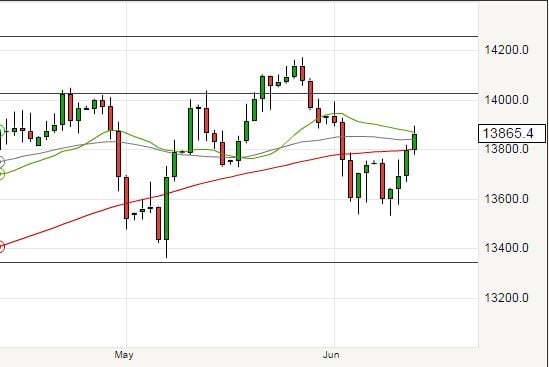Pound / Euro Exchange Rate Rises on Industrial Production Data and Merkel Comments
The pound to euro conversion will enter the next week on the front foot following the recent positive run - how far can the currency pair climb though?
Markets have become used to the improvements in performance in the Eurozone economy – something that has allowed bond yields to stabilise and the euro to push higher.
However, Eurozone Industrial Production data released on Friday the 12th of June has missed the mark resulting in a rout of the euro.
Industrial Production (MoM) (Apr) increased by 0.1%, well below market expectations for a reading of 0.3%.
This miss has come as something of a shock to currency traders who have had to re-value the euro.
The pound to euro exchange rate (GBPEUR) pushed higher by half a percent in the wake of the data and is trading at 1.3882 – nearly 0.7% higher than seen on the previous day.
We are now forecasting a return to at least 1.40 in coming days.
Note that the market rate is not the rate received when making international payments. Banks offer you a rate at their discretion, for instance we are seeing an average high street offer at 1.475. An independent FX provider will get you closer to the market though without charging a fee. This can result in up to 5% more FX in some instances.
The moves higher are entrenching upside momentum with breaks above the 20 and 50 day moving averages being recorded today – a technical indication that advocates for further upside momentum.
However, as the below shows the range in GBPEUR remains well established suggesting resistance to gains lies at around the 1.40 line.
As such we see the potential for gains towards 1.40 where we would expect a significant amount of traders to exit the market and book profits.
We would suggest that those with impending euro payments consider any levels between here and 1.40 as good transaction points.
Those waiting for higher rates should watch for a break above 1.42 to occur, this could then prompt the gradual move towards end-2015 forecasts held by major institutions at around 1.43.
Merkel Speaks... Euro Falls
If the IP data was the trigger to the euro's falls against the pound sterling then German Chancellor added the fuel.
Merkel defended the easy ECB policy and the weaker euro.
German Chancellor Merkel asked for understanding for what central banks have to do if inflation is low.
She also mentioned that it is difficult for countries like Portugal to implement/ profit from structural reforms when the euro is too strong.
"This unusual support from Germany for a loose monetary policy and a weak euro pushed EUR/USD (temporary) to the mid 1.11 area," notes Piet Lammens at KBC Markets.
Time to Forget Greece as a Driver of the Euro?
A lot of time is being dedicated by currency commentators to the Greek situation.
Indeed, uncertainty and Greece are often put together to explain moves in the euro.
However, evidence suggests that the link may be weak at best; this is something being picked up on by other commentators.
Regarding the euro's falls, “the retreat is not explained by developments on the Greek front, as negative as they may be: when news broke of the IMF’s abandonment of talks, the exchange rate was essentially unfazed,” points out Asmara Jamaleh at Intesa Sanpaolo.
Profressional trader Kathy Lien at BK Asset Management reflects, "based on the price action of the euro, we are starting to think that investors either want Greece to default or they no longer care about the risks,"
The single most important driver of the euro exchange complex remains German bund yields which are in turn largely slave to the ECB’s asset purchase programme.
For Greece, the next important appointment will be the Eurogroup meeting next week, on Thursday, 18 June, with the Greek standoff as the first item on the agenda.
“The exchange rate’s limited reactivity to the unfavourable developments on the Greek front does not rule out a correction in the event of the prospects of an agreement definitively falling through, opening up a scenario which would see Greece exit the euro,” says Jamaleh.
Looking ahead at the next week GBP-EUR will be driven by important UK economic data releases.
The following observations are made by Jacqui Douglas at TD Securities:
1. CPI (Tues 16 June): We’re looking for inflation to rise more than expected and rebound from -0.1% Y/Y in April to +0.3% Y/Y in May. Inflation readings have been stronger than expected across most of Europe in May, and the rebound in fuel prices should also be a key driver.
2. Employment Data (Wed 17 June): We look for the unemployment rate to remain unchanged at 5.5% in April as widely expected, sticking at its lowest level since July 2008. More broadly, the unemployment rate is still falling at a fairly steady rate, and the drop in the claimant count suggests that there is still further downside to come.
3. Retail Sales (Thurs 18 June): We look for UK retail sales to pull back in May after the huge 1.2% gain the month before. We think that we’ll see around a -0.5% decline which would disappoint consensus, as the weather turned colder and fuel prices rebounded, as consumers put the brakes on their recent spending sprees.






